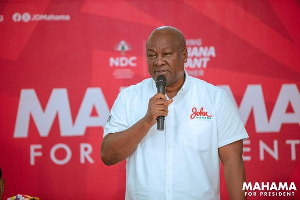In a world where access to quality healthcare often hinges on the ability to pay, the vision of universal free primary care is a revolutionary beacon of hope. Former President John Dramani Mahama is championing a transformative approach that seeks to dismantle the barriers erected by insurance-based systems, advocating for a healthcare model that prioritises the well-being of all citizens.
Imagine a healthcare landscape where every individual, regardless of their socioeconomic status, can receive essential medical services without the burden of out-of-pocket costs. In this article and several subsequent ones, I will dig into Mahama's visionary plan, exploring the potential benefits and challenges of implementing free primary health care, the implications for public health, and how this initiative could serve as a blueprint for nations grappling with healthcare inequalities.
Please join me as I explore how Mahama's groundbreaking vision could revolutionise primary healthcare, making it accessible, equitable, and truly centered on the needs of the people.
As rising costs and insurance complexities create barriers to care, millions find themselves navigating a convoluted system that often prioritises profit over patient well-being. In this context, the call for reform grows louder, advocating for a model that simplifies access, reduces financial strain, and prioritises holistic health outcomes. Former President John Dramani Mahama's vision for free primary care without the burden of insurance seeks to revolutionise healthcare accessibility.
Mahama's approach is not merely a political stance; it is a compassionate response to an urgent need. His proposal aims to dismantle the barriers that prevent individuals from seeking medical attention due to financial constraints, geographical limitations, or bureaucratic red tape. By prioritising primary care, Mahama envisions a system that addresses health issues before they escalate, focusing on prevention and early intervention as cornerstones of public health.
This introduction sets the stage for a comprehensive exploration of Mahama's vision, delving into the challenges faced by current healthcare systems and the transformative potential of his proposed reforms. As I navigate the intricate relationship between healthcare access and societal well-being, it becomes clear that the need for reform is not just a matter of policy, it's a matter of humanity.
Through Mahama's innovative lens, we can begin to envision a future where healthcare is a fundamental right, accessible to all, irrespective of their socioeconomic status.
Opinions of Tuesday, 8 October 2024
Columnist: Anthony Obeng Afrane
Revolutionising healthcare: Mahama's vision for free primary care without insurance
Entertainment














